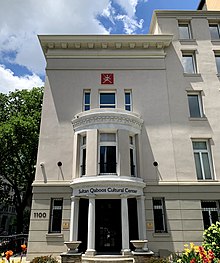
Oman, officially the Sultanate of Oman, is a country located in West Asia. It is situated on the southeastern coast of the Arabian Peninsula, and spans the mouth of the Persian Gulf. It shares land borders with Saudi Arabia, United Arab Emirates, and Yemen, while sharing maritime borders with Iran and Pakistan. The capital and largest city is Muscat. Oman has a population of nearly 4.7 million and is ranked the 124th most-populous country. The coast is formed by the Arabian Sea on the southeast, and the Gulf of Oman on the northeast. The Madha and Musandam exclaves are surrounded by United Arab Emirates on their land borders, with the Strait of Hormuz and the Gulf of Oman forming Musandam's coastal boundaries.

Muscat is the capital and most populated city in Oman. It is the seat of the Governorate of Muscat. According to the National Centre for Statistics and Information (NCSI), the total population of Muscat Governorate was 1.72 million as of September 2022. The metropolitan area spans approximately 3,500 km2 (1,400 sq mi) and includes six provinces called wilayats, making it the largest city in the Arabian Peninsula by area. Known since the early 1st century AD as an important trading port between the west and the east, Muscat was ruled by various indigenous tribes as well as foreign powers such as the Persians, the Portuguese Empire and the Ottoman Empire at various points in its history. A regional military power in the 18th century, Muscat's influence extended as far as East Africa and Zanzibar. As an important port-town in the Gulf of Oman, Muscat attracted foreign traders and settlers such as the Persians, Balochs and Sindhis. Since the accession of Qaboos bin Said as Sultan of Oman in 1970, Muscat has experienced rapid infrastructural development that has led to the growth of a vibrant economy and a multi-ethnic society. Muscat is termed as a Beta - Global City by the Globalization and World Cities Research Network.
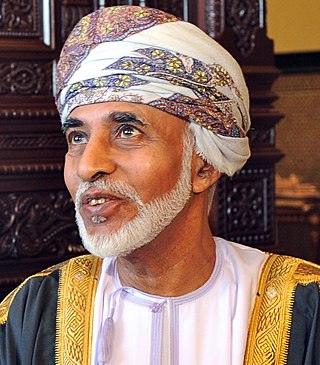
Qaboos bin Said Al Said was Sultan of Oman from 23 July 1970 until his death in 2020. A fifteenth-generation descendant of the founder of the House of Al Said, he was the longest-serving leader in the Middle East and Arab world at the time of his death, having ruled for almost half a century.

Salalah is the capital and largest city of the southern Omani governorate of Dhofar. At the 2020 census, it had a population of 331,949.

Nizwa is the largest city in Ad Dakhiliyah Region in Oman and was the capital of Oman proper. Nizwa is about 140 km (87 mi) from the Omani capital Muscat. The population is estimated at around 83,544 people.
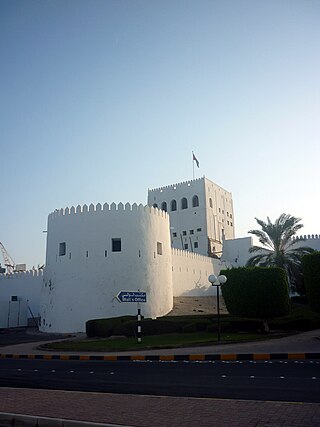
Sohar is the capital and largest city of the Al Batinah North Governorate in Oman. An ancient capital of the country that once served as an important Islamic port town on the Gulf of Oman, Sohar has also been credited as the mythical birthplace of Sinbad the Sailor. It was historically known as Mazūn (مَزُوْن).
Education in Oman is provided free of charge up to end of secondary education, though attendance is not mandatory at any level. In 1970 there were only three formal schools with 900 students in the whole state. Oman's national educational program expanded rapidly during the 1970s and the 1980s, with the Kingdom of Saudi Arabia sending teachers on its own expense during that time period. In 2006–2007 about 560,000 students attended 1053 public schools. The number of students in private schools is about 65,000. There are also extensive programmes to combat adult illiteracy. Sultan Qaboos University, the only national university near Muscat, was founded in 1986, and in 2006 it had 13,500 students. The Human Development Report found the literacy rate to be 93.0% in adults, up from 54.7% in 1990. For the same period, the youth literacy rate increased from 85.6 to 97.3%. Public expenditure on education was reported to be 4.6% of GDP and 26.1% of total government spending.
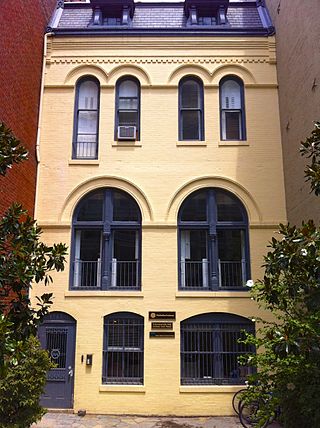
The Middle East Institute (MEI) is a non-profit, non-partisan think tank and cultural centre in Washington, D.C., founded in 1946. It seeks to "increase knowledge of the Middle East among the United States citizens and promote a better understanding between the people of these two areas."

Oman is an absolute monarchy in which all legislative, executive, and judiciary power ultimately rests in the hands of the hereditary sultan, and in which the system of laws is based firmly on the monarchs made laws. Although a report by the U.S. State Department, based on conditions in 2010, summed up the human rights situation in the country by asserting that the government "generally respected the human rights of its citizens,", several international human-rights groups have described the state of human rights in Oman in highly critical terms. Article 41 of Oman's statute (constitution) criminalizes any criticism of the sultan, stating that "the sultan's person is inviolable and must be respected and his orders must be obeyed".

This page list topics related to Oman.
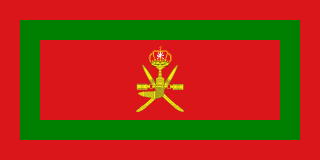
The House of Busaid, also known as Al Said dynasty, is the current ruling royal house of the Oman, and former ruling royal house of the Omani Empire (1744–1856), Sultanate of Muscat and Oman (1856–1970) and the Sultanate of Zanzibar (1856–1964). It was founded by Ahmad bin Said al-Busaidi, ruler of Oman and its east African territories at the time.
The National Museum of the Sultanate of Oman is a museum located in Oman. It was developed as a result of a ten-year collaboration between the Ministry of Heritage and Culture, the Royal Estate Affairs of Oman, Jasper Jacob Associates (J.J.A.), and Arts Architecture International Ltd (A.A.I.), and opened to the public in 2016.
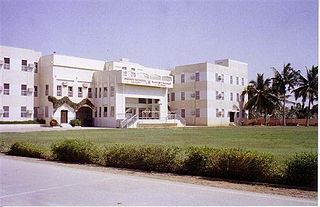
The Indian School Salalah is an Indian-run, self-financing, co-educational institution, primarily established to meet the academic needs of children of Indian expatriates working in the Sultanate of Oman in the Persian Gulf. The school also admits children of other nationalities. The school is located in the Dahariz area, of Salalah town, in the southern governorate of Dhofar.

Sayyid Badr Al-Busaidi is the Foreign Minister of Oman. Sayyid Badr has represented Oman in regional and international meetings, which include the United Nations.

The Royal Oman Police (ROP), also known as Oman Police, is the main law and order agency for the Sultanate of Oman. It maintains a helicopter fleet and also carries on the duties of safeguarding the long Omani coastline.

Women in Oman now pursue careers and professional training, moving from their previous and traditional role at home to the public sphere. In Oman, 17 October is celebrated every year as the Omani Women's Day with various pro-female events.
The Royal Opera House Muscat (ROHM) is Oman's premier venue for musical arts and culture. The opera house is located in Shati Al-Qurm district of Muscat on Sultan Qaboos Street. Built on the royal orders of Sultan Qaboos of Oman, the Royal Opera House reflects unique contemporary Omani architecture, and has a capacity to accommodate maximum of 1,100 people. The opera house complex consists of a concert theatre, auditorium, formal landscaped gardens, cultural market with retail, luxury restaurants and an art centre for musical, theatrical and operatic productions.

Jalan Bani Bu Ali is a commercial town and tourist destination in Oman.

Dr. Salem Ben Nasser Al-Ismaily is an Omani advisor at the Omani Ministry of Foreign Affairs. Al-Ismaily was previously the chairman and chief executive officer of the Sultanate of Oman Public Authority for Investment Promotion and Export Development, or Ithraa. Al Ismaily has been conferred by the Sultan of Oman, Haitham bin Tariq, the second class order of Oman and by Qaboos bin Said bin Taimur, the late Sultan of Oman, the third and the second class orders of Oman.

Hilal bin Ali bin Hilal Al-Sabti was born on October 27, 1972. On June 16, 2022, His Majesty Sultan Haitham Bin Tariq has issued a Royal Decree appointing Dr. Hilal bin Ali bin Hilal Al Sabti, as the new Minister of Health. He succeeded His Excellency Dr. Ahmed Al Saidi on this new role.
